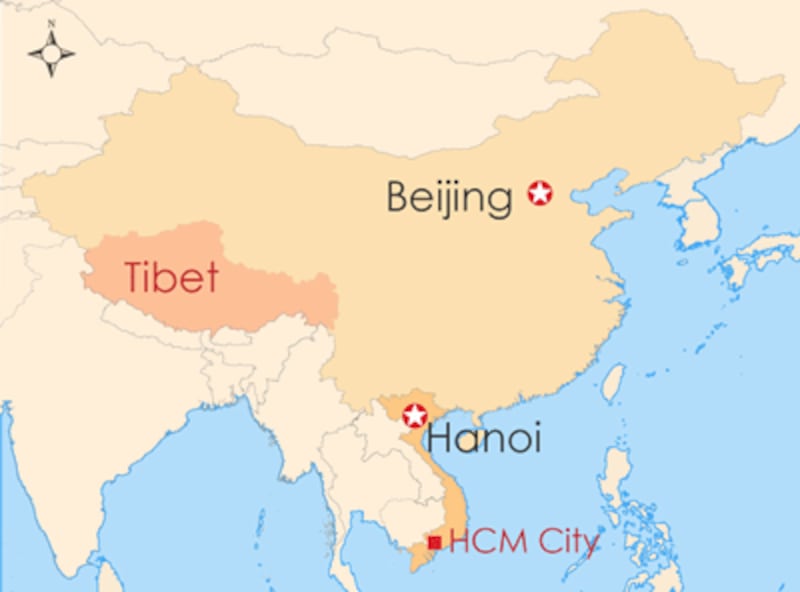Self-immolation protests by Tibetans may be the only recourse in their struggle for religious freedom and against Chinese rule, the patriarch of the outlawed Unified Buddhist Church of Vietnam said in a letter to Tibet's spiritual leader the Dalai Lama.
"Self-immolation is indeed a tragic and extreme act, one that should be avoided at all costs," Thich Quang Do, who is under house arrest, said in the letter clandestinely sent last week to the France-based International Buddhist Information Bureau.
"But there are moments when this ultimate gesture, that of offering one’s body as a torch of Compassion to dissipate darkness and ignorance is the only possible recourse," the 83-year-old Do said in the letter which the bureau said had been sent to the Dalai Lama.
In the letter, Do, an outspoken advocate for human rights and democracy in Vietnam, invoked one of the best known cases of a self-immolation by a Vietnamese Buddhist monk at the height of the Vietnam war in 1963.
"His act, filmed by the international media, shook the conscience of the world," Do said, referring to the burning to death of monk Thich Quang Duc at a busy Saigon road intersection in protest over the alleged persecution of Buddhists by South Vietnam's Roman Catholic-led government.
“It is therefore with a deep sense of communion and understanding, but also with infinite pain and grief, that I learn of the immolation of such young Buddhist monks and nuns in Tibet, and the escalation of violence by China’s communist regime to prevent the world from hearing their tragic cry," Do said.
He said the current situation in Tibet is a "challenge to all humanity" and called on world leaders to demand an end to the violence and press for an independent international investigation into the self-immolations.
Do, who is held under house arrest at the Thanh Minh Zen Monastery in Ho Chi Minh City, said Buddhists in Vietnam backed the Tibetan struggle.
"Your suffering is our suffering. Your struggle is our struggle. The Buddhists of Vietnam stand beside you in this non-violent movement for religious freedom and human rights. For without human rights, human beings can never fully and freely exist."
Fiery protests

Twenty-two Tibetans have self-immolated to protest Chinese policies and rule in Tibetan regions since a wave of the fiery protests began in February 2009. Three other self-immolations were reported in early February this year in a remote region of Sichuan province, but have never been confirmed due to communication problems stemming from a stepped-up crackdown by Chinese security forces.
The latest self-immolation occurred on Friday when a Tibetan monk burned himself to death after protesting Chinese security intrusions at his monastery in China’s western Qinghai province.
The Chinese authorities have labeled the self-immolators as terrorists and blamed the Dalai Lama for the tense situation, saying he is encouraging the self-immolations, which run contrary to Buddhist teachings.
But the Dalai Lama blamed China's "ruthless and illogical" policy towards Tibet.
He called on the Chinese government to change its "repressive" policies in Tibet, citing the crackdown on monasteries and policies curtailing use of the Tibetan language.
Tensions
Tensions in the Tibet Autonomous Region and in Tibetan-populated areas in China's provinces have not subsided since anti-China riots swept through the Tibetan Plateau in March 2008.
Do said the Unified Buddhist Church of Vietnam "will never forget" the Dalai Lama's numerous appeals throughout the 1990's aimed at obtaining the release of Vietnamese dissidents from jails.
"Today, I am still under house arrest ... after almost three decades under different forms of detention. Yet I am always with you in spirit."
Do was "obviously taking a very grave risk" in speaking out while under house arrest, Vo Van Ai, the Paris-based overseas spokesman for the Unified Buddhist Church of Vietnam told RFA.
"But he is ready to take those risks for human rights and for the Buddhists in Tibet and the Unified Buddhist Church of Vietnam which is suffering repression on the same scale," Ai said.
Do is not facing any charges but is allowed to go outside the monastery only twice a month for medical purposes, Ai said.
"His communications are monitored, visitors are intercepted and there are policemen inside and outside the monastery watching. He is not even allowed to preach inside the monastery."
Reported by RFA's Vietnamese service. Written in English with additional reporting by Parameswaran Ponnudurai.
